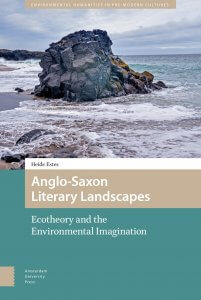
“Anglo-Saxon Literary Landscapes: Ecotheory and the Environmental Imagination,” authored by Professor Heide Estes, Ph.D., has been positively reviewed by The Medieval Review and Hereditas Nexus.
In her book, Estes, a professor in the Department of English, argues that a study of Old English and Latin texts from early medieval England demonstrates that the idea that humans are entitled to earth, animals, and even other humans as “resources” is “not a symptom of the Industrial Revolution, but a set of pre-existing ideologies that enabled it.”
Professor Michael Bintley of the University of London writes, “In the current political climate, in which medieval studies is the process of re-evaluating its complicity in the perpetuation of structures of privilege, Literary Landscapes is a timely reconsideration of both origins and antidote…. [T]his is an important study that offers a much-needed single-author assessment of landscapes in early English literature from an ecocritical perspective, and which also shows the necessity of including ecocritical perspectives and their many entanglements in the wider global and transhistorical discussions to which the field contributes and must continue to contribute.”
For Hereditas Nexus, Wouter van Dijk writes, “Estes makes clear her effort is to be seen as a first step in using ecocritical theories for the examination of historical texts, in order to learn more about our current behaviour. In providing food for thought about using these relatively new theories while conducting historical research, she certainly succeeded.”
“Anglo-Saxon Literary Landscapes” was published by Amsterdam University Press (AUP) in 2017. Estes is currently editing a volume of essays, also for AUP, Medieval Ecocriticisms: Animals, Landscapes, Objects, and the Nature of the Human.
